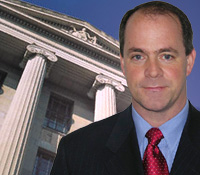CRACKING DOWN
ON PUBLIC CORRUPTION
Why We Take It So Seriously...and Why It Matters To You
06/20/05
 It's
#4 in our top 10 list of investigative priorities—following counterterrorism,
espionage, and cyber. Why do we rank it so highly? What are we doing
to stop it? For the answers to these questions and more, we talked
with Supervisory Special Agent Dan O'Brien, chief of our Public Corruption
and Government Fraud program at FBI Headquarters.
It's
#4 in our top 10 list of investigative priorities—following counterterrorism,
espionage, and cyber. Why do we rank it so highly? What are we doing
to stop it? For the answers to these questions and more, we talked
with Supervisory Special Agent Dan O'Brien, chief of our Public Corruption
and Government Fraud program at FBI Headquarters.
Q: Why's the
FBI so concerned about public corruption?
Dan: Two main reasons. First, it strikes at the core
of what our country's about. Our democracy depends on a healthy, efficient,
and ethical government—whether it's in the courtroom or the halls
of Congress. Second, public corruption can have a direct impact on
national security. For example, in a recent case in Arizona, 26 current
and former department of motor vehicles (DMV) employees were indicted
for taking cash bribes for fake driver's licenses, ID cards, and even
a hazmat license. What if it's a terrorist trying to get one of those
licenses? We've also seen bribes paid at our borders to let drugs come
into the country. Again, what if a bribe lets a terrorist get through?
Q: What kinds
of crimes are involved?
Dan: They run the gamut. Embezzlement. Voter fraud. Subsidy fraud.
Illegal kickbacks. For example, a health inspector might threaten to report
code violations unless a restaurant owner pays a bribe. Or a government official
might award a contract in exchange for free work on his home or some other
favor.
Q: What are
you doing to stop public corruption?
Dan: Plenty. We've got a strong national program with agents in place
around the nation dedicated to the issue. In our investigations, we use every
tool we've got—our cyber capabilities, our surveillance skills, our ability
to track financial dealings around the world. Last year, we opened over 900
cases, which led to over 650 convictions or guilty pleas. We're also proactive.
We've got analysts specifically trained to uncover corruption, and our agents
always have an eye out for new and evolving angles. We’ve got a new initiative
to identify DMV employees nationwide who issue fraudulent IDs for bribes and
kickbacks. And we’re working with state governments to identify fraud
and ways to prevent it.
Q: Does public
corruption really have an impact on people's lives?
Dan: Absolutely. Public corruption can take funding away from your
child's school and even prevent your street from being re-paved. Police who
take bribes endanger your neighborhood. And guess who ultimately foots the
bill for these crimes? We all do...through higher taxes. The Government Accountability
Office estimates that at least 10 percent of the funding for federal government
programs is lost to public corruption and government fraud every year. We're
talking tens of billions of dollars.
Q: Last question:
what should people do if they come across evidence of public corruption
activities?
Dan: By all means, call us!
If you don't want to give your name, leave an anonymous tip.
Links:
Public
Corruption website | More
stories
Editor's
note: Special Agent Dan O'Brien took another
position in the FBI in late 2005. The current
chief of the Public Corruption Unit is Michael
J. Anderson.


